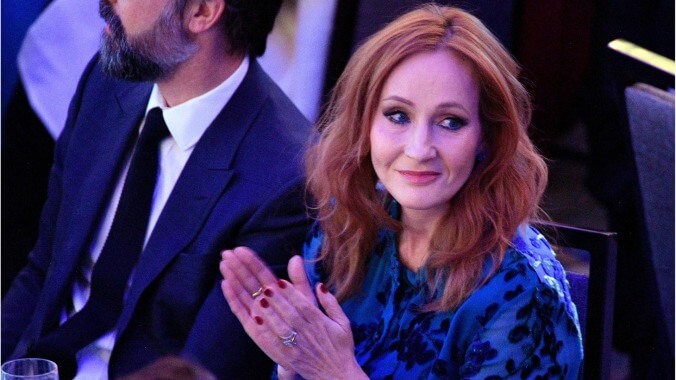In J.K. Rowling's latest novel, the author seems sorry, but only for herself
The Ink Black Heart follows a protagonist who feels all too familiar: an internet-maligned fantasy writer facing transphobia accusations

Although few things sound less appealing than spending a day in J.K. Rowling’s mind, there’s something disturbingly fascinating about the author’s inability to stop unspooling it publicly. After establishing herself as the mastermind behind one of the most successful fantasy series ever, Rowling found herself looking over a vast, dedicated community of Harry Potter fans in June 2020, many of them queer and gender non-conforming— and in an instant, she Daenerys Targaryen-ed it on Twitter.
In the Tweets That Shall Not Be Named, Rowling took issue with a Devex article that used the inclusive term “people who menstruate.” Denying trans identities and ostracizing countless fans in the process, Rowling insisted the tweet should have used “women” instead, writing: “I know and love trans people, but erasing the concept of sex removes the ability of many to meaningfully discuss their lives. It isn’t hate to speak the truth.”
After a cascade of backlash from fans, Rowling sickeningly doubled down with a lengthy essay where she mocked LGBTQ+ advocacy group GLAAD and even resorted to the time-honored GOP bathroom argument favored by such esteemed cultural critics as Ted Cruz. “When you throw open the doors of bathrooms and changing rooms to any man who believes or feels he’s a woman—and, as I’ve said, gender confirmation certificates may now be granted without any need for surgery or hormones—then you open the door to any and all men who wish to come inside,” she wrote. Somehow, after all this, Rowling apparently still has more to say—her latest book The Ink Black Heart, released under her pseudonym Robert Galbraith, addresses the situation without an ounce of subtlety and with even more TERFy verve.
The Ink Black Heart follows a YouTuber named Edie Ledwell who faces the disdain of an internet mob after being accused of racism, ableism, and transphobia. The latter backlash—the type Rowling is most familiar with—is focused on a character in Edie’s children’s cartoon described as a “hermaphroditic worm.”
Despite the crudely overt similarities between Rowling and Edie, the author has sworn the novel isn’t about her. “I had written the book before certain things happened to me online,” Rowling shared recently on The Graham Norton Show. “I said to my husband, ‘I think everyone is going to see this as a response to what happened to me,’ but it genuinely wasn’t. The first draft of the book was finished at the point certain things happened.”
Okay…sure? Perhaps Rowling’s husband can attest to her saying the book isn’t about her experience, but the author’s victim complex and abhorrence of so-called “social justice warriors” are reportedly reflected in the pages. Rowling’s weak refusal of her status as the Edie in her own life doesn’t exactly hold up when (spoiler alert), the character is doxxed, assaulted, and ultimately stabbed to death, a violent end Rowling-as-Galbraith not-so-subtly pins on, you guessed it, “social justice warriors.” Whether Edie’s, Galbraith’s, or (most likely) Rowling’s, this book is an allusive manifesto if ever there was one.
Really, whether the novel came pre- or post-Rowling’s online firestorm is irrelevant—either way, The Ink Black Heart seems like a blaring call from inside the house. Rowling sees herself as solely a victim, her self-righteous blinders concealing the reality that she’s a wealthy, white, cisgender person with the power to harm. She can imagine a character akin to herself being murdered for their beliefs but doesn’t seem too pressed that her rhetoric surrounding trans identities has proven lethal effects in those communities, especially among youth. As one observant Twitter user noted, the book is 200 pages longer than David Foster Wallace’s Infinite Jest. All those words, and not one syllable conveying sympathy, let alone regret, towards the countless ostracized fans whose identities she has denied and demeaned?
Although Rowling may have no interest in rectifying her reputation with readers, there are other cardinal members of the Potter-verse who have taken a very different approach: namely, Harry Potter himself. In the wake of Rowling’s earliest transphobic comments, Radcliffe shared an open letter to fans via The Trevor Project’s website. In the piece, he urged Harry Potter lovers not to let the curdled logic of their world’s creator tarnish their connection to the story— and the ways they saw themselves represented there.
“To all the people who now feel that their experience of the books has been tarnished or diminished, I am deeply sorry for the pain these comments have caused you,” he wrote. “I really hope that you don’t entirely lose what was valuable in these stories to you. If these books taught you that love is the strongest force in the universe, capable of overcoming anything; if they taught you that strength is found in diversity, and that dogmatic ideas of pureness lead to the oppression of vulnerable groups; if you believe that a particular character is trans, nonbinary, or gender fluid, or that they are gay or bisexual; if you found anything in these stories that resonated with you and helped you at any time in your life — then that is between you and the book that you read, and it is sacred. And in my opinion nobody can touch that.” Against all odds (and maybe even Rowling’s own wishes), Hogwarts still finds a way to raise them right.